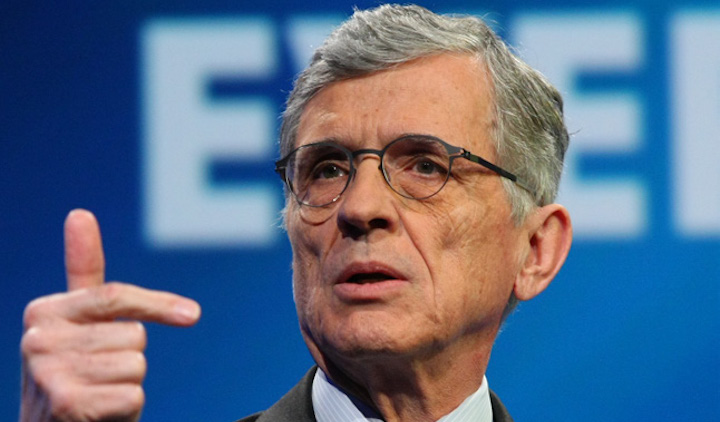FCC’s Wheeler Makes Impassioned Plea for Title II

The smarter way to stay on top of broadcasting and cable industry. Sign up below
You are now subscribed
Your newsletter sign-up was successful
FCC chairman Tom Wheeler used his final policy speech to make an impassioned plea for retaining the FCC's Open Internet rules and reclassification of ISPs as common carriers, saying "No company using the Internet is safe absent the kind of common carrier requirements America has historically expected of its networks."
That came at what was billed as his final public address—at The Aspen Institute in Washington, D.C., where Wheeler will be a senior fellow after he leaves the commission Jan. 20.
Wheeler pulled out all the stops, saying that without Open Internet order protections, ISPs could demand tribute for access, control the cloud, dim the light of the Internet of Things, and otherwise limit choice and competition.
He cited zero rating of owned content as one threat to competition—the FCC's Wireless Bureau released a report this week citing AT&T's DirecTV Now as an example of that. “We have already seen how AT&T and Verizon have favored their own video services by zero-rating their product while forcing consumers to pay data charges for competitors. Just take that behavior and look how it would affect other 21st century services.”
He argued that the Open Internet rules actually benefitted ISPs by allowing them to get into the edge business. "During my tenure, we approved AT&T’s becoming the country’s largest video provider, and Verizon acquired AOL," he said. "Critical to that expansion is the assurance of network openness, and the protection of privacy and security so as to not abuse the extreme power that network ownership naturally brings with it. By providing those assurances, our rules actually facilitate network operators’ expansion into edge services."
He even enlisted broadcasters in the fight for the rules, saying that even they recognized that the new ATSC 3.0 advanced transmission standard's return path depended on access to broadband networks.
"No company using the Internet is safe absent the kind of common carrier requirements America has historically expected of its networks," he said. "Even broadcasters’ new ATSC 3.0 depends on open networks. Because it is a one-way capability, ATSC 3.0 requires a return path. Competitors to broadcasters control that pathway. Absent open access, the success of ATSC 3.0 could be in the hands of those whose video interests are quite different from those of broadcasters."
The smarter way to stay on top of broadcasting and cable industry. Sign up below
The outgoing chairman clearly saw the threats to the Open Internet order from his Republican colleagues assuming the majority and from a Republican congress looking to reverse Title II.
He warned that Congress would try to redefine network neutrality in a way that would not preserve the protections against blocking, throttling and paid prioritization that are rooted in Title II.
Actually, Wheeler himself initially did not favor Title II reclassification, or at least offered another path, before changing his mind with the help of the President of the United States and perhaps HBO's John Oliver, who called him out as a former lobbyist and compared him to a dingo babysitter.
Wheeler invoked his familiar gatekeeper analogy for ISPs, saying they have the incentive and ability to use their power to benefit themselves even if it harms their customers and the public interest.
He said he was not "casting aspersions" at ISPs, though they could have been forgiven for feeling aspersion-cast, suggesting it was just the nature of the self-interested business beast, a "historical fact" reflecting basic human nature. He likened the "human impulse" that required speed limits.
"The delivery of products and services that will define our future demands gatekeeper-free access to networks," he said of the Internet of Things. "If ISPs can decide arbitrarily which IoT devices can be connected, or favor their IoT activity over that of competitors, the bright future dims."
Wheeler also said it would be tougher for the FCC to reverse the Open Internet order than some have suggested. He called the court's upholding of the Open Internet order as a "resounding affirmation of the FCC's authority" as well as the soundness of the decision based on the record.
"If there is a reversal of the Open Internet rule," he said, "it will have a high hurdle to vault to prove to the same court why its 2016 decision was wrong."
The chairman also suggested that there was no "fire" that needed putting out by reversing Title II, and that ISPs' business was going gangbusters.
He even cited President-elect Donald Trump's meeting with AT&T President Randall Stephenson this week. "Yesterday, the CEO of AT&T reportedly told the President-elect that his company had been the country’s leading investor of capital for each of the last five years," he said. "This, of course, includes the two years since adoption of the Open Internet rules. A recent report pegged overall network investment at $76 billion for 2015, which is an increase from the year I arrived at the Commission."
It is time to keep moving forward, Wheeler concluded. “This is not the time to retreat and take things away."
But forward is to a Republican Administration and Congress that are set on undoing that Title II legacy.
Contributing editor John Eggerton has been an editor and/or writer on media regulation, legislation and policy for over four decades, including covering the FCC, FTC, Congress, the major media trade associations, and the federal courts. In addition to Multichannel News and Broadcasting + Cable, his work has appeared in Radio World, TV Technology, TV Fax, This Week in Consumer Electronics, Variety and the Encyclopedia Britannica.

